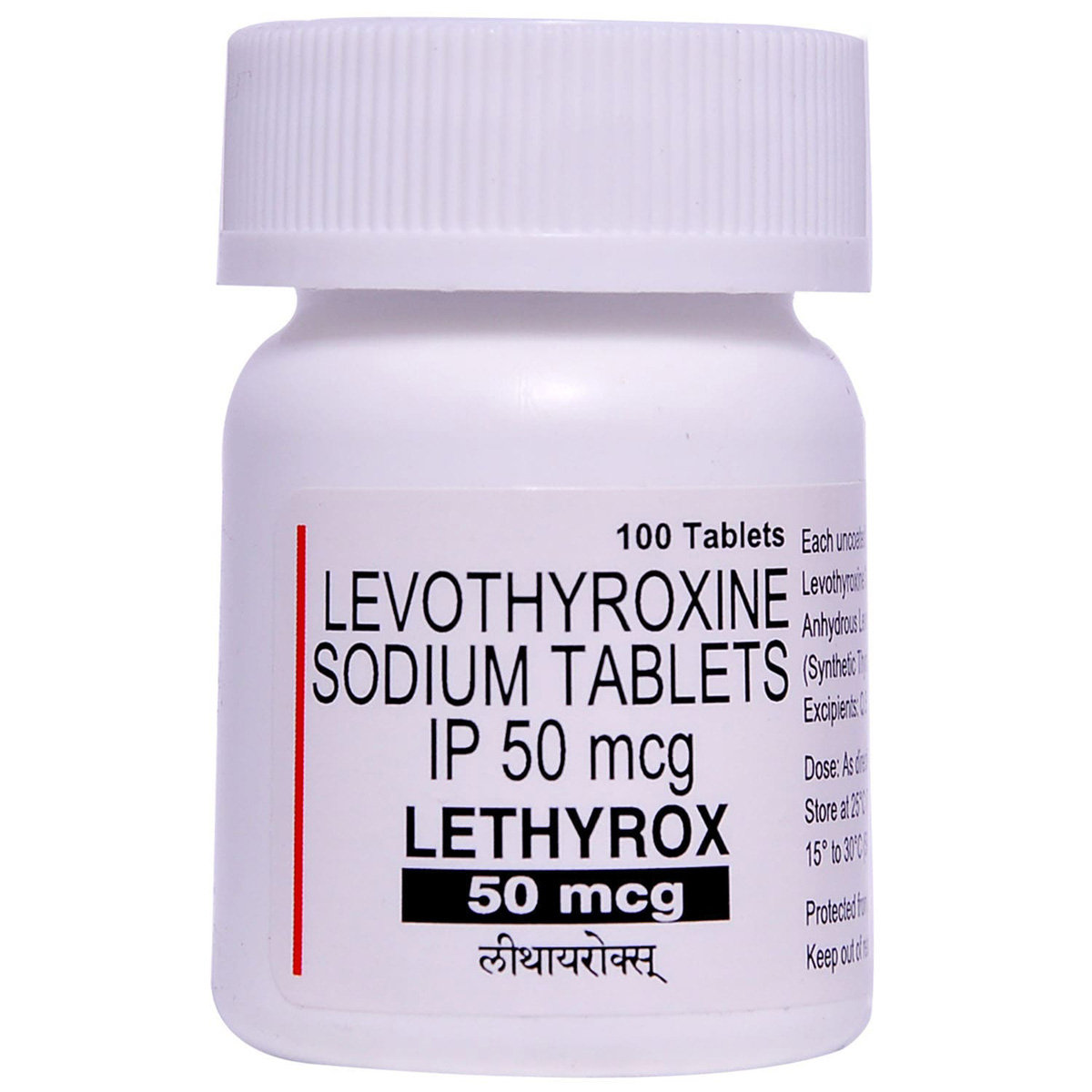Thyroup 50 Tablet 120's
MRP ₹129.5
(Inclusive of all Taxes)
₹19.4 Cashback (15%)
Selected Pack Size:120
120 ₹116.6
(₹0.97 per unit)
In Stock
100 ₹116.6
(₹1.17 per unit)
In Stock
Provide Delivery Location
Online payment accepted
 Prescription drug
Prescription drugWhats That
Composition :
Manufacturer/Marketer :
Consume Type :
Expires on or after :
Return Policy :
NPPA :
About Thyroup 50 Tablet
Thyroup 50 Tablet is primarily indicated for the treatment of hypothyroidism or low secretion of thyroid hormone. It comprises levothyroxine which is a synthetic thyroid hormone that is chemically similar to thyroxine produced by our thyroid gland. Levothyroxine helps to replace missing thyroid hormones and/or relieve stress on the thyroid gland.
Thyroup 50 Tablet minimizes symptoms of low thyroid hormones like unknown weight gain, fatigue, sensitivity to the cold and many more. Thus, it helps in replacing the body's own natural thyroid hormone essential for maintaining both mental and physical health.
Take Thyroup 50 Tablet as prescribed by your doctor once daily, on an empty stomach, one-half to one hour before breakfast with a full glass of water. Thyroup 50 Tablet usually does not have major side effects when taken regularly in the prescribed dosage but, overdosage may cause headache, nervousness, sleeplessness, irritability, diarrhoea, muscle spasm, weight loss, feeling hot even in cool environments, menstrual irregularities (in women) and skin rash. If you missed a dose do not take a double dose as it may produce serious side effects.
Your doctor may prescribe calcium or vitamin D supplements alongside Thyroup 50 Tablet for your bone health. Thyroup 50 Tablet should not be used for the purpose of weight loss alone. People affected with diabetes taking Thyroup 50 Tablet may have altered blood glucose control that may result in increased antidiabetic agents or insulin requirements. Hence, it is recommended that people with diabetes should contact a doctor and carefully monitor their glucose level after starting, changing or discontinuing thyroid hormone therapy.
Uses of Thyroup 50 Tablet
Directions for Use
Key Benefits
Thyroup 50 Tablet minimizes symptoms of low thyroid hormones like unknown weight gain, fatigue, sensitivity to the cold and many more. Thus, it helps in replacing the body's own natural thyroid hormone essential for maintaining both mental and physical health. However, Thyroup 50 Tablet should not be used for the treatment of weight loss or obesity.
Storage
Drug Warnings
Foods like soybean flour, cottonseed meal, cabbage, cauliflower, walnuts, dietary fibre, calcium and calcium-fortified juices may affect the working of Thyroup 50 Tablet . Hence, avoid the intake of these foods within several hours of dosing if possible. Thyroup 50 Tablet should not be administered to patients with acute myocardial infarction and high blood pressure patients. So, close clinical monitoring of heart function is recommended before taking Thyroup 50 Tablet .
Drug-Drug Interactions
Drug-Drug Interactions
Login/Sign Up
Thyroup 50 Tablet may interfere with blood glucose control and decrease the effectiveness of diabetic treatments.
How to manage the interaction:
Inform doctor about all other medications administering, including vitamins and herbs, is crucial. Consult doctor before stopping any medications.
Drug-Food Interactions
Drug-Food Interactions
Login/Sign Up
Tofu Set With Calcium, Ragi, Seasame Seeds, Kale, Milk, Almonds, Bok Choy, Calcium-Fortified Soy Milk, Cheese, Yogurt
How to manage the interaction:
Consumption of calcium supplements/calcium-rich foods, along with Thyroup 50 Tablet may create an insoluble compound that affects the absorption of Thyroup 50 Tablet. Avoid consumption of calcium supplements/calcium-rich foods during treatment with Thyroup 50 Tablet.
Diet & Lifestyle Advise
- Eating the right nutrients and taking a regular dose of your prescribed medications may help reduce your symptoms and improve your thyroid function. Iodine, zinc and selenium are beneficial for people with hypothyroidism. However, it’s best to avoid iodine and selenium supplements unless your doctor advises you to take them.
- In hypothyroidism usually, there is a loss of calcium (hypocalcemia) and Vitamin D in our body. In such a case, people affected with hypothyroidism should opt for calcium-enriched foods.
- People with hypothyroidism usually have a slower metabolism and eating more protein may help boost your metabolism.
- Daily yoga and aerobics exercises can help in boosting the metabolism.
- People with hypothyroidism should prefer the intake of more vegetables, fruits and lean meats. These foods are low in calories and may help prevent weight gain.
- Avoid taking Goitrogens (agents which interfere with the normal function of the thyroid gland) which generally includes soy foods (tofu), cabbage, broccoli, kale, cauliflower, spinach, sweet potatoes, cassava, peaches, strawberries, millet, pine nuts, peanuts, etc.
Side Effects of Thyroup 50 Tablet
- Irregular heartbeat (palpitations)
- Muscle spasm
- Headache
- Nervousness
- Irritability
- Sleeplessness
- Tremors
- Muscle weakness
- Increased appetite
- Weight loss
- Diarrhoea
Habit Forming
Therapeutic Class
All Substitutes & Brand Comparisons
RX
Out of StockThyroxee 50 Tablet 100's
Zee Laboratories Ltd
₹38.74
(₹0.35 per unit)
63% CHEAPERRX
Out of StockThyrobol 50 Tablet 120's
K C Laboratories
₹110.5
(₹0.83 per unit)
14% CHEAPERRX
Out of StockThyroxium 50Mcg Tablet 100'S
Elder Pharmaceuticals Ltd
₹103
(₹0.93 per unit)
4% CHEAPER
Author Details
We provide you with authentic, trustworthy and relevant information
Drug-Diseases Interactions
Drug-Diseases Interactions
Login/Sign Up
FAQs
Special Advise
- Doses beyond the range of may produce serious or even life-threatening manifestations of toxicity. Thus, if you forget to take Thyroup 50 Tablet anytime, take the medicine as soon as you remember to take it. However, if it is almost time for your next dose, you make avoid the skipped dose and continue with your regular regime as advised by your doctor.
- Thyroup 50 Tablet should not be used for the treatment of obesity or for weight loss.
- Patients with adrenaline or pituitary gland problem, heart diseases, diabetes, clotting disorders should not take Thyroup 50 Tablet without consulting doctor as the dose may need to be adjusted.
- Diabetes patients taking Thyroup 50 Tablet should contact the doctor before starting this medicine as it may worsen glycaemic control and may result in increased antidiabetic pills or insulin therapy.
- Regular intake of Thyroup 50 Tablet may decrease bone mineral density, particularly in post-menopausal women. Hence, consult your doctor who might prescribe you the lowest dose possible for your bone health.
- If you are taking Thyroup 50 Tablet prior to any surgery let your doctor know about this.
- Thyroid function tests are usually done on an empty stomach after overnight (6-8 hrs) fasting.
- Patients with rare hereditary problems of galactose intolerance, the Lapp lactase deficiency or glucose-galactose malabsorption should not take this medicine.
Disease/Condition Glossary
Hypothyroidism/underactive thyroid: It is a chronic condition when the thyroid gland does not make enough thyroid hormones to meet your body’s needs. When there is a low level of thyroid hormones, our body’s functions and metabolism slow down. Symptoms of hypothyroidism include fatigue, increased sensitivity to cold, constipation, dry skin, unexplained weight gain, puffy face, hoarseness of voice and muscle weakness. There may be a loss of Calcium and Vitamin D in some cases of hypothyroidism.

Have a query?
Alcohol
Safe if prescribed
You are recommended not to consume alcohol along with Thyroup 50 Tablet to avoid unpleasant side-effects.
Pregnancy
Consult your doctor
Only consume Thyroup 50 Tablet , if you are prescribed by a doctor. However, the need for levothyroxine may increase during pregnancy due to increased blood levels of oestrogen (female sex hormone) hence, monitoring of thyroid function should be done regularly both during and after pregnancy. In this case, thyroid hormone dose can be adjusted by your doctor.
Breast Feeding
Consult your doctor
Even during high dose levothyroxine therapy, the amount of Thyroup 50 Tablet passing into the breast milk during lactation is very low and therefore harmless. However, if you have any doubt consult a doctor.
Driving
Safe if prescribed
Thyroup 50 Tablet does not interfere with your ability to drive.
Liver
Consult your doctor
Thyroup 50 Tablet can be taken in the prescribed dose as it does not affect the liver.
Kidney
Consult your doctor
Thyroup 50 Tablet can be taken in the prescribed dose as it does not affects the kidney. However patient with adrenal gland complication or problem should consult a doctor before its intake.
Children
Safe if prescribed
Thyroup 50 Tablet can be given to the children (new-borns and infants) with inborn thyroid hormone deficiency. To achieve normal mental and physical development. The doctor would adjust the dose individually according to the thyroid hormone level and TSH values measured in blood.

















